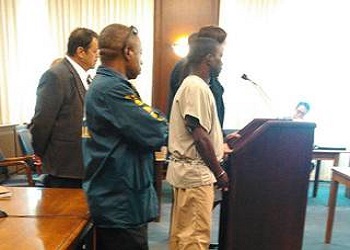Former Haitian rebel leader and Senator-elect Guy Philippe pleaded not guilty to drug trafficking and money laundering charges presented today in a Miami court, a case that seems to be a message to other political elites in Haiti suspected of criminal activities.
Philippe was arrested by Haitian police on January 5 as he exited a radio station in Piétonville near the capital. He was transferred to agents of the US Drug Enforcement Administration (DEA) that same day before being rapidly extradited to the United States, reported the Miami Herald.
Philippe’s arrest occurred just four days before he was to be sworn in as a senator, a process that would have provided him with immunity following his victorious November campaign in the Haitian province of Grand Anse.
According to a 2005 indictment unsealed on January 6, Philippe faces accusations that he participated in cocaine trafficking to the United States between 1997 and 2001, and conducted illicit transactions of illegally obtained assets between 1999 and 2003 in Florida.
Philippe pleaded not guilty to the charges during the January 13 hearing in a Miami court, the Associated Press reported. Philippe has previously denied the allegations and claimed through his lawyers that his status as senator-elect provides him with immunity from prosecution.
Philippe’s lawyer Zeljka Bozanic told InSight Crime that while “it is premature to comment about the facts of the case at this time, [Mr. Philippe] was elected senator and with that said, the way he was arrested and flown to the US violated his rights and the international laws.”
Bozanic’s comments seem to relate in part to the legal contradictions between a bilateral extradition treaty signed by the United States and Haiti in 1904, and the island’s constitution amended in 2012.
Article 41 of the Haitian constitution states that “no person of Haitian nationality may be deported or forced to leave the national territory for any reason whatsoever.” Reports have emerged of a possible parliamentary debate on Philippe’s extradition over which elected politicians have been voicing criticism. (Several other members of the incoming parliament are also suspected of involvement in the drug trade and other crimes.)
The State Department recognizes this contradiction but stated in 2015 that “although the Haitian Constitution prohibits extradition of Haitian nationals, the Government of Haiti has willingly surrendered Haitians and other nationals under indictment in the United States to U.S. law enforcement agencies.”
The US Attorney’s Office declined to respond to InSight Crime’s request for comment on the case, saying through a spokesperson that the government “will not comment or provide any opinions regarding this matter as it is pending before the court.”
Philippe served as a high-ranking police officer in Haiti from 1997 to 2000. During this time, he is suspected of having used his position to protect drug shipments of Colombian cocaine moving through Haiti to the United States.
Philippe fled to the Dominican Republic in 2000 after he was accused of planning a coup against then-President René Préval. In 2004, the former policeman participated in a coup attempt against Préval’s successor, Jean-Bertrand Aristide.
He later made several unsuccessful attempts to enter politics through democratic channels before his recent senatorial victory, all while evading US attempts to capture him. The senator-elect had settled in the Pestel coastal town of Grand Anse where he maintains a base of popular support, reported the New York Times.
Philippe is also the subject of a Haitian arrest warrant issued in July 2016 accusing him of orchestrating an attack on a police station that left five dead, including a police officer.
InSight Crime Analysis
Philippe’s extradition to the United States to face drug charges when he stands accused of arguably more serious crimes in Haiti speaks to the Caribbean nation’s lack of confidence in the ability of its judicial institutions to handle cases involving political elites.
The ties between elites and organized crime have grown particularly concerning in light of the country’s dire economic situation and political instability. Structural deficiencies in the justice system have allowed organized crime to go largely unchecked in Haiti. According to the US State Department, corruption was only criminalized in 2014 and, “to date, there have been no successful convictions on drug trafficking or corruption-related charges in Haitian courts.”
Given this context, it is likely that the United States may have exerted pressure on Haitian authorities in order for Philippe to be arrested before being sworn in as senator, as a means of signalling a stance against corruption on the island.
Indeed, according to the Center for Economic and Policy Research, “over the summer, a source close to the Haitian government, who requested anonymity, suggested that the US would move against Philippe before he became Senator to ‘send a message’ to the incoming parliament, which includes other figures accused of corruption and drug trafficking.”
Due to the array of electoral candidates with criminal records and suspicions of being involved in illegal activities, the Miami Herald had warned in August 2016 that the island’s parliament could be filled with “legal bandits.”
SEE ALSO: Coverage of Elites and Organized Crime
Regardless of the motivation for Philippe’s extradition, the move is unlikely to have much long-term impact in terms of reducing criminality and corruption among Haiti’s political elite. As InSight Crime has previously explained, extraditing criminal suspects to the United States may reduce the possiblity that they will escape justice for their alleged crimes, and it may help dismantle important criminal networks. But at the same time, it can reduce the incentive for countries to carry out institutional reforms necessary to reduce the widespread impunity seen around the region.

